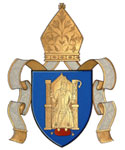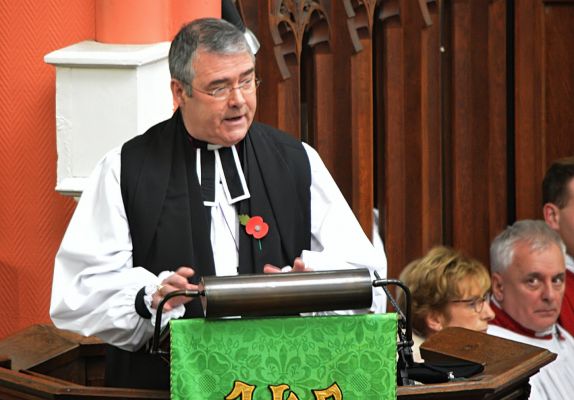 |
 |
News
Bishop of Clogher preaches at Remembrance Sunday service

The Bishop of Clogher Right Revd John McDowell preaching at the Remembrance Service.
The Bishop of Clogher, Right Revd John McDowell, has referred to the depth of trauma suffered from acts of brutality, in his address on Remembrance Sunday.
Speaking in St. Macartin’s Cathedral, Enniskillen, he said: “Given where we are here in Enniskillen, not a quarter of a mile from an act of brutality which would compare with anything that happened during the Great War, I wonder do we (Government and people) really appreciate the depth of trauma that still exists at our soul’s centre and are we really prepared to face up to what it will cost, in every sense, to address that trauma?
“Healing cannot take place where there is no hope. Healing is a long process and can’t be achieved through a bureaucratic procedure no matter how well meaning. If Government and society failed the families of the millions who we remember with pride and solemnity today perhaps we should not repeat the mistake for those who are standing right beside us and whose hearts still break.”
The Bishop’s full text:
May all the words that I say to be in the name of the Prince of Peace, whose love knows no limits and whose compassion never fails.
1 Maccabees 9:14-21
Revelation 21: 21-24
St John 15: 9-15
The Great War ended almost unexpectedly. It wasn’t marked by the feelings of euphoria and celebration which we associate with 1944. The four years of experience of total war had left Europe exhausted. As we say simply, the guns fell silent.
Not surprisingly the public mood of relief soon gave way to feelings of frustration and of anger. Unlike the brothers of Judas Maccabeus, families in the United Kingdom had not been able to lay their dead to rest with dignity and were left with all the unresolved emotions which we now know that will bring. Many servicemen had died deaths of much suffering. Many too had succumbed to disease, their health already weakened by a lifetime of poor housing and dire living conditions.
Some like the poet Edward Thomas had a macabre but unspectacular end. He had simply stepped out of the dugout behind his post and had leaned into an opening to fill his pipe. A shell passed so close to him that the blast of air stopped his heart. He dropped to the ground dead without a mark on his body.
In the United Kingdom the last General Election had been held in 1910. Since then the Representation of the People Act had trebled the size of the electorate and the Prime Minister, David Lloyd George, decided to make the slogan “Hang the Kaiser” the centre of his election campaign. A first hint of populism.
However the government of the Netherlands, whence the Kaiser had fled, politely refused to extradite him, so the action moved to the great Peace Conference at Versailles where the matter of the post-war world took centre stage.
Here, at home, the first “war literature” began to appear. It took many forms - memoirs, novels, left wing political tracts and rightwing polemic. It provided an opportunity for Winston Churchill to coin that most famous quip about the dreary steeples of Fermanagh and Tyrone and what he called the “integrity” of their quarrel. Perhaps surprisingly some of the most enduring books to come out of the war were collections of poetry. Wilfred Owen’s “rifles rapid rattle” is etched into our understanding of the experience of war.
However in the longer term the most influential book to come out of the Great War wasn’t a memoir, or a collection of poetry. It was a very slim volume of 120 pages which, of all things, was about economics. John Maynard Keynes’ The Economic Consequences of the Peace”.
Keynes had been a junior member of the British negotiating team at Versailles, though in the end he had resigned out of disgust at the short sightedness of the Allied Powers. In the book he reserved his harshest judgements for the vengefulness of the French President,Georges Clemenacau, but he has some pretty sharp things to say about Lloyd George also.
Keynes was convinced that, exhausted and all as the Allies were by 1918, they had an opportunity to lay the foundations of a new European order. An order which would address many of the competitive appetites which he believed had been at the root of what had caused the war in the first place. It wasn’t quite the new heaven and a new earth which we heard about in the second reading but was nevertheless a vision for a society where the State (which had demanded great sacrifices from ordinary people during the war) would take a much more active part in creating a just society.
Instead the conference at Versailles (like many a European conference since) obsessed about borders and security; punishing Germany with fines which in the end it was never able to pay. It took another conflagration in Europe in the Second World War before Keynes’ ideas were taken up and the institutions for a new, what we now call “rules based” world order, were established- NATO, the United Nations, economic collaboration in the European Iron and Steel Federation and currency stability in Bretton Woods.
Of course those who we remember here today didn’t come back to any society at all. But one of the reasons why we remember them is because they had died fighting for something greater than their own survival. That’s a large part of the nobility of their sacrifice.
When you read through the memoirs and particularly the letters of those who fought in the Great War you find all sorts of motivations for fighting, with patriotism foremost among them. It isn’t often expressed in the language of political theory. The people who we are remembering today simply wanted the freedom to live in a country where a person isn’t forbidden from doing what they want to do or forced to do what someone else wants. Above all they wanted happiness and stability for their families-a fulfilling job to do; a decent house; food on the table. That was the civilisation they yearned for and died for.
Instead those who they left behind and those of their comrades who returned came back to what TS Eliott called at the time “the immense panorama of futility and anarchy which is the contemporary world”. A world of poor housing, few jobs, debt. A world still fixated by violence as an expression of strength and so indifferent to the lives of ordinary people that in 1939 about a quarter of those who volunteered for military service were deemed unfit because of underlying health problems.
The First World War was an immense, collective, physical and mental trauma for millions throughout Europe. In some senses the wounds of that war have never healed. By and large returning soldiers and their families were simply left to get on with it. Somehow or another many managed to do just that. But many did not. Perhaps the depth and breadth of the psychological trauma was just too great for any government or any society to deal with.
After all our understanding of the effects of conflict was in its infancy then. There was no National Health Service and virtually no counsellors.
But we don’t have those excuses today.
Indeed given where we are here in Enniskillen, not a quarter of a mile from an act of brutality which would compare with anything that happened during the Great War, I wonder do we (Government and people) really appreciate the depth of trauma that still exists at our soul’s centre and are we really prepared to face up to what it will cost, in every sense, to address that trauma?
Healing cannot take place where there is no hope. Healing is a long process and can’t be achieved through a bureaucratic procedure no matter how well meaning. If Government and society failed the families of the millions who we remember with pride and solemnity today perhaps we should not repeat the mistake for those who are standing right beside us and whose hearts still break.
It is often said that World War One veterans rarely spoke of their experiences. Perhaps recalling in detail would have been too painful. Perhaps they wanted to protect those who they loved. Or perhaps they didn’t speak because they knew that people would not listen. You see truly to listen means giving not just our ears but our eyes, our minds and our hearts to those who suffer. Someone once said that being with a person who is suffering without being affected by that suffering is like expecting to walk through water without getting wet. Sadness and grief are the hardest emotions to deal with. Anger is much easier.
Remembrance Sunday in Enniskillen is always a day of mixed emotions. Thankfulness for the sacrifice of so many from this area who gave their lives to battle or disease one hundred years ago. Gratitude to the many since then who may have had to put on a uniform and carry a gun but who had peace on their minds. Compassion for those whose hurt and burning indignation remain.
And, I trust, in a great arc of compassion above all of these, the love of God in Jesus Christ; in whose sacrifice the sorrows and sins of the whole world were concentrated and burnt up, when He went deeper into human suffering than even war itself could go and rose on the third day with a Kingdom in his hand.
And now to the king of ages, the one true God, be ascribed all might majesty dominion and power as is most justly due. AMEN.